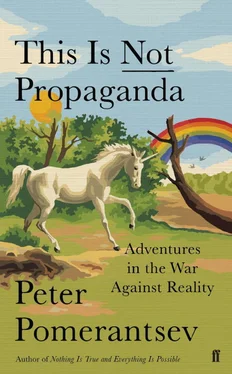Leaping the Wall
Britain, Russia, the thing once known as the West, so many of the countries that had experienced ‘democratisation’ after the end of the Cold War were in a swirling state where notions of progress and identity were in flux. It would take more than a few regulations to fix that.
But what about China? Was it on another trajectory, one that perhaps I wouldn’t like, but which at least could have coherence, a concept of the future one could engage with, even if in opposition to it? Could I find the future in Beijing?
It was my first-ever visit, and at Chinese passport control I had my fingerprints recorded and my photo taken, to be fed into a system of web cameras across the country which would instantly identify me wherever I might be – a reminder that China represents a sort of Dismaland of mass persuasion and surveillance, with every method of manipulation and control I have touched on in this book, and some more besides. Out in the west of the country there are labour camps right out of early-twentieth-century totalitarian dictatorships; in other places things resemble the 1970s. China has a human rights movement called Charter 08 (signed in 2008), which echoes Charter 77 (signed by Václav Havel and Czechoslovak dissidents in 1977). As with Cold War dissidents, Chinese signatories are imprisoned, marched onto television to confess their ‘crimes’, exiled.
For more contemporary techniques there are the legions of the Fifty Cent Army, so-called for the fifty cents they are paid to leave pro-government comments on Chinese social media. Researchers at Harvard University have established that these troll farms allow some criticism, but immediately censor any hints at protest. ‘The Chinese people are individually free but collectively in chains,’ concludes one study. [2]
Many Western websites are blocked in China behind the Great Firewall, so one has to use Internet services controlled by companies loyal to the regime. If any country would be first to perfect the use of data imprints to target people according to cognitive, psychographic and behavioural patterns, it would be China.
And then there’s the ‘social credit score’, still under development, which promises to gather all the information about every individual Chinese person’s behaviour, from how much money they spend on alcohol to their financial health to whether they visit their parents regularly, and then crunch it into a number that defines whether one can get a bank loan, a job, permission to travel.
China also has a full suite of foreign policy informational approaches. There’s the vast international broadcaster, CGTN; the social media trolls who taunt politicians in neighbouring Taiwan; the pressure exerted on foreign academics who investigate the country. [3]A 2013 Pentagon paper reviewing China’s doctrine of ‘Three Warfares’ (economic, media and legal) concluded that it showed ‘twenty-first-century warfare guided by a new and vital dimension: namely the belief that whose story wins may be more important than whose army wins’. [4]This had been exhibited in the South China Sea, where China had annexed vast maritime spaces by first building artificial islands and then claiming the surrounding waters as its own, all without firing a shot.
But what, I thought as I moved through the immaculate, ambitious airport, created as a symbol of China’s emerging strength for the 2008 Beijing Olympics, were all these techniques there to buttress?
*
2049. The date is repeated like a mantra in Beijing – in Communist Party speeches, on posters, in newscasts, pop videos, social media posts – so that it seems the whole vast country is being concentrated into a single year. The politburo of the Communist Party has declared that 2049 is the year the Chinese People’s Republic will finally achieve ‘full modernisation’. 2049 also coincides with the centenary of the founding of the People’s Republic of China, still run by the Communist Party created by Soviet agents in the 1920s to spread the revolution to the East, but which has long since outgrown its original progenitor and transformed into something far more rich and strange.
When I first landed in Beijing, 2049 intrigued me. Could it be that here, after futureless, flattened Moscow, London and Washington, after all the nebulous nostalgias, I would find a hint of historical perspective?
The cityscape of Beijing reinforced the impression of progress, rising from the narrow alleys of the old town, where workmen in white vests slept in dark doorways with steaming barrels of soup behind them, up through the smog-shrouded, endless cubist hills of Communist apartment blocks, which often make Beijing indistinguishable from Moscow, and then up to the boastful, bullying ambition of the Central Business Area, with skyscrapers that manage to be both gargantuan and somehow squat, as if they are titans taking dumps in a line. These lead to the mind-bending building that houses the headquarters of CGTN, promoting China across the world as something big, inevitable, immovable, intimidating. From a distance the building looks like a giant pair of empty trousers striding across the skyline, but as you draw closer you realise it’s one continuous tube, with the two towers at the side joined at the top and bottom into what the designers call a ‘three-dimensional cranked loop structure’, a vast, jagged, glass and steel uroboros.
In the staff cafeteria of Tsinghua University, an establishment with immaculate lawns that features its own opera house, I asked two academics what the future designated by 2049 was meant to bring. They immediately started disagreeing. One argued the official line: China was still on the path to Communism, but as the Communist idea of objective history presupposed that Communism had to proceed from capitalism, the party had fostered its own capitalism in order to be able to then surpass it with a return to true Communism. The other academic thought China was using capitalism as a way to return to a previous model of Chinese greatness, to a Confucian empire which, she argued, had little notion of linear historical development. 2049 was meant to see China’s return to a futureless past.
China was sounding more familiar.
The next day I met with Angela Wu, a media and communications scholar from Beijing who now taught at New York University, and who had researched the formation of political identities on the Chinese Internet. I wanted her to explain to me what being pro- or anti-regime here really meant.
As we walked along the side of a traffic-congealed motorway, we passed posters bearing the latest government slogans:
‘Community of Shared Future of Mankind!’
‘Democracy! Liberty! Justice! Friendliness!’
The terms were in such contradiction with reality that their effect was to strip these pretty words of any intrinsic meaning, so they became signals that had to be loyally repeated to show fealty.
We were on our way to the school Wu had attended as a child, where her own journey into investigating ‘self-formation’ on the Chinese Internet had begun.
On the outer walls of her old school were head shots of the latest, most successful leavers, along with the names of their destination universities, printed on laminated posters to protect them from the rain. The vast majority were heading to the US. Opposite were huge sports fields, where Wu’s exploration of political identity first began, quite by accident. As a pupil she had never understood why she wasn’t being allowed to join the Communist Youth League. She had been marked down for ‘political performance’, but she had never even had any thoughts about politics at the time. Finally a teacher told her the reason. Every morning all the school had to gather in the playing fields for ‘radio calisthenics’: mass warm-up exercises performed to music and instructions blared out from a radio loudspeaker. Officially it was exercise, but the teachers used it as a way of measuring ‘political appropriateness’: was one prepared to fully participate in collective activities? Wu thought herself too cool and clever to dance with too much determination. She hadn’t meant it as a form of political rebellion, but her teachers had marked her down for it.
Читать дальше












